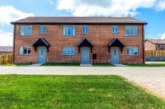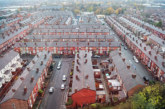According to research conducted by CEBR for Shelter and the National Housing Federation, the next government could add £51.2bn to the economy, including £12bn profit to the taxpayer, by building 90,000 social homes a year. The findings are presented in a new report released this week entitled ‘The economic impact of building social housing’.
The report delves into the significant economic and social benefits of building 90,000 social homes a year, which the sector believes is necessary to fix the housing crisis and end homelessness. The cost-of-living crisis is showing no signs of abating and social housing is the only genuinely affordable housing tenure, with rents on average around 50% cheaper than private rents.
The report demonstrates how building 90,000 social homes a year would provide both immediate and long-term value for money for the Government and the economy, for example directly supporting nearly 140,000 jobs in the first year alone, and within three years, return £37.8bn back to the economy, largely by boosting the construction industry. The report also highlights how delivering more social housing would generate huge savings for the taxpayer across multiple departments, as follows:
- £4.5bn savings on housing benefit
- £2.5bn income from construction taxes
- £3.8bn income from employment taxes
- £5.2bn savings to the NHS
- £4.5bn savings from reduction in homelessness
- £3.3bn savings to Universal Credit
More money from government to help fund the delivery of more social homes would be transformative in a number of ways
Ian McDermott, Chief Executive of Peabody, commented: “With one in 50 Londoners and one child in every classroom effectively homeless and in temporary accommodation, the growing housing emergency needs to be addressed now.
“With its spring budget just around the corner, the Government has the power to put forward a plan that addresses growing homelessness while simultaneously providing a much-needed boost to the economy.
“Building such a huge number of social homes will be a challenge but it’s one we and our partners can rise to — but only if increased public investment is available.
“Without the investment and delivery of not-for-profit housing associations in the past decade, the problem would be even worse. But despite our best efforts, the housing emergency has intensified.
“Rising costs, high interest rates, chronic public underinvestment and an urgent need to spend money on our existing homes has taken funding away from building new social homes.
“More money from the Government would help fund more social rented homes and be transformative in a number of ways, addressing a range of social and economic issues. It would also ultimately be cheaper for the taxpayer, saving councils vast sums on temporary accommodation, and reducing the amount of housing benefit that goes directly to private landlords.
“We could begin to tackle the housing crisis, taking people out of poverty, boosting health and stimulating supply chains, while driving sustainable growth. The whole country would benefit from tens of thousands of new jobs and billions more pumped into the economy.
“An affordable home that is safe and comfortable is the foundation of good health and wellbeing, and I think the single best way of alleviating poverty and improving social mobility.
“This report, along with a housing crisis that’s getting worse by the day, should be yet another stark wake up call for the Government to take decisive action.”
Investing in social housing makes economic sense
Andy Hulme, Chief Executive of The Hyde Group, said: “This report proves investing in the most affordable homes makes economic sense as well as being the right thing to do to help solve an acute housing crisis.
“The research is well timed as new data shows that the number of affordable homes expected to be started in London is on track to fall by more than three-quarters this year.
“We started over 2,100 new homes last year, and are determined to keep building.
“While we have no plans to cut our housebuilding programme, things are being made harder for the wider sector without a clear long-term plan from government for affordable homes.
“Research shows that London’s largest housing associations lost £19bn of funding when social housing rents were reduced for four years and later capped. For Hyde this meant we had almost £10,000 less available to spend on each of our social homes.
“Ahead of next week’s budget, we want to challenge this government to live up its promise on long-term decisions by making a ten-year plan for both rents and the Affordable Housing Programme, which will leverage in billions of pounds of additional private sector investment to build more of the social and affordable homes which people need.”










